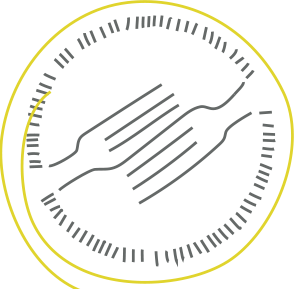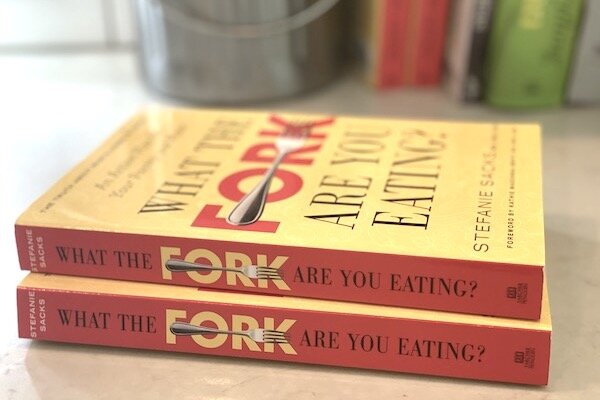WHAT THE FORK ARE YOU EATING?
What The Fork is coming out in audio August 2020! What a gift to have this opportunity over five years after its print release. I spent over a week in studio narrating this encyclopedic guide on why and how to make healthier food choices only to realize that what I wrote nearly seven years ago is still very relevant (progress please?!?!?!), though I did write a new introduction (see below) and update the GMO chapter. I hope this book continues to enlighten as many people as possible. It may just be more digestible in audio (no pun intended) as I was able to add my sense of humor and snark to the read (gotta find ways to lighten up such a tough topic!). Love and light to you all!
2020 UPDATED INTRO TO WTF
Welcome to What the Fork Are You Eating, an invitation to be your healthiest self. This book will help you: (1) think differently about food; (2) feel empowered to make healthier choices; and (3) get curious about cooking. I won’t push “low sodium,” “low fat,” and “no sugar” down your throat. Counting calories, or any kind of deprivation, is not my thing. Staunchly supporting a particular way—veganism, vegetarianism, paleo, or keto—is just not my schtick. Special medical diets and cleanses have their place but not one is a panacea. This is not a diet book; it’s the antithesis. My goal is to give you enough information to ask the important questions while also offering you the tools to take action. This is your chance to become more food literate. If your health and wellbeing need improvement, then how you choose food is the starting point. So, dare ask yourself, “What the fork am I eating?” And begin to love yourself with the nourishment you choose.
I am a Culinary Nutritionist—a certified chef with an MS in nutrition education from Teachers College, Columbia University, as well as a Certified Nutrition Specialist (CNS) and Certified Dietitian Nutritionist (CDN). For decades, I have been in the trenches, teaching individuals and groups how to prevent and manage illness as well as restore health through food lifestyle changes, sometimes big and sometimes small. Basically, we chat, shop, and cook! Many clients and students call me a food therapist, as I have a unique ability to use food as a deep conduit to healing for others, like I did for myself.
The 1980s, my teenage years, marked the start of my healthy eating journey that, over time, morphed into my zeal to look at all the ways that food choice can impact health outcomes. I suffered terrible allergies, asthma, recurring bronchitis, and pneumonia as a child. Doctors kept prescribing drugs and I kept getting sicker. What I didn’t know then, but know now, is that multiple traumas—Adverse Childhood Events (ACEs)—made me physically ill. My deeply distressing experiences prompted an internal chaos that no child should ever have to confront. Thanks to the groundbreaking work of Dr. Bessel Van Der Kolk and many others, there is now enough science to confirm that suppressing trauma does not stop stress hormones from wreaking havoc both physically and emotionally. Releasing these experiences and developing coping mechanisms are the key to healing. As a teenager, using hope as my guide, I managed by taking my health into my own hands through food choice—something I could control to mitigate the disorder in my life. Having muscled through a brief period of anorexia in my tweens, it was time to make friends with food! My innate creativity and love for cooking became an outlet, one where I could begin, without consciously knowing it at the time, to heal. As I slowly got physically well (the psycho-emotional part would follow), I realized three things that continue to shape my life today:
I truly understood the power that food has to influence a body’s ability to heal, recover from chronic illness, and stay well;
I began questioning why more people didn’t know about this, and even if they did, I wondered whether they would have the knowledge and skills to make the shift that I did; and
I had an undeniable need to turn my pain into purpose.
Saying that the stakes couldn’t be higher right now for global health and wellness is an understatement. I’m writing this new introduction in the middle of the COVID-19 pandemic, which has closed the doors on everyday life as we know it and created mind-bending challenges for everyone. However, it has also offered immense opportunity to slow down and decide how we want and can step forward into a better version of ourselves for tomorrow. I am optimistic, that with the right information and tools, we can all positively shift. I hope that What the Fork can be an encyclopedic guide to make a difference in what and how you eat.
This book first came out in 2014. I have spent the years since its release observing firsthand the increased global demand for access to healthy food choices. Amazon would not have bought Whole Foods Markets if they didn’t see an epic business opportunity. Let’s be real! According to a 2018 Food & Health Survey by the International Food Information Council Foundation (IFIC)—a 501c3 dedicated to effectively communicating science-based information on health, nutrition, and food safety for the public good—sustainability is increasingly important and consumers are more willing to pay for foods without artificial ingredients and GMOs. However, “green-washing”—the process of conveying misleading information about how a company's products are more environmentally friendly—is very real. And consumer confusion is rampant, continuing to add heightened stress to shoppers. I would certainly be remiss if I did not give credit to the corporations that have taken steps to remove harmful ingredients from products. However, in 2017, food companies spent $11 billion on television ads, 80 percent ($8.8 billion) of which was spent on their unhealthiest offerings—ultra processed foods like sugary soda, fast food, and unhealthy snacks. The net result? Confusion and poor health prevail.
In fact, according to the Centers for Disease Control, 2017-2018 statistics confirm that the prevalence of obesity is still on the rise. The onslaught of insta-experts and celebrities pitching on-trend health perfection with little credible education, as well as doctors fabricating food and nutrition expertise and promising to change your life if you opt into their diet book, create a surefire recipe for edible indecision as we aim to find real food solutions to our public health crisis.
Did you know that physicians have an average of 19.6 hours of nutrition education over the course of four years of medical school? Whereas dietitians and nutritionists have well over 1,200 hours. Therefore, when it comes to diet and health, doctors are not necessarily the best ones to offer effective guidance. I mean no disrespect to the medical profession or to the many doctors who have tirelessly extended their training to study nutrition science and food. However, get your dietary advice from those in the know. You will be less puzzled or hopefully better informed.
My mission is to teach you what I have learned with the highest level of authenticity and integrity. And if you haven’t figured it out already by the title of my book as well as my personal transparency, I have a very low capacity for BS. You will learn about what I call the Top-Rated Terminators (TRTs), the things in your food (or being done to your food) that are just not cool. I explain what the TRTs are, why they are “bad,” and how to replace them with the Better for You Alternatives. This should whet your appetite for your trip to the market in Section Three. My Pantry Rehab will feng shui your food before I help you navigate the grocery store, by decoding Nutrition Facts, ingredient lists, health claims, and funny (and not-so-funny) food lingo, and offering aisle-by-aisle Supermarket Strategies. And last but not least, learn to love what you eat in Meal Rehab, where you’ll get tips on how to balance your plate as well as a repertoire of recipes.
Committing to change is no small feat—it takes time, patience, acceptance, and compassion for yourself. Been there, done that and still doing it. I am a work-in-progress, just like you. So, if you walk away from this book only altering one thing, then that is good enough! I am here to celebrate what you can do, never judge or condemn what you can’t. And I am truly humbled to be your guide.

